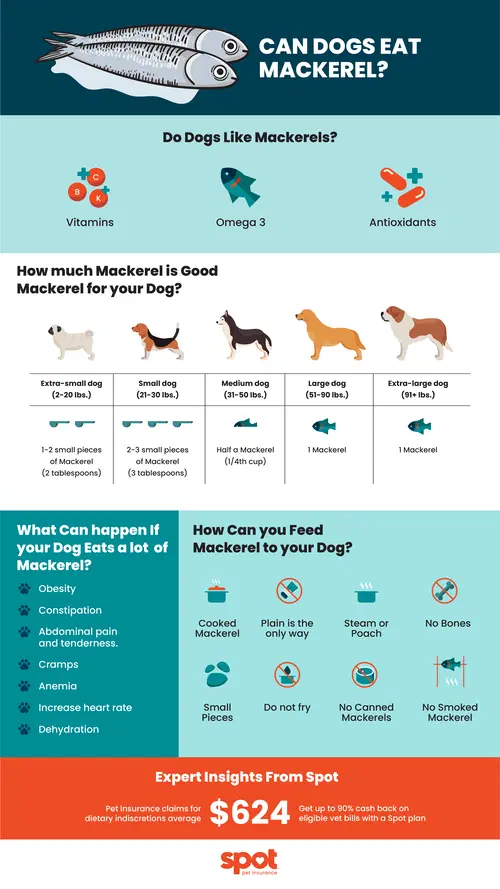Mackerel is a common term given to all the pelagic fish, basically the ones who hang in the middle of the ocean avoiding the deep and the shores. They usually have deeply forked tails and a tiger like skin with stripes on their backs. It is fatty and oily in nature. With a lot of essential nutrients in it, it can be one of the super foods for your dog. So the answer is Yes! Your dog can very well have Mackerel. Now one more question is whether they like it or not?
Do Dogs like Mackerels?
Dogs love the smell of fish. So that is one checkpoint. Second is dogs are fascinated with bones in general. And give their history of having a preference for eating fish, we can with confidence say that Mackerels are typically on the good food list for dogs.
Are Mackerels Good for Your dog?
Mackerels contain very high amount of Omega 3 and 6 fatty acids.1 Apart from that they also form a good source of high protein. To add to the list, it gives Vitamin B12 and D, amino acids and essential minerals for your doggo. And each of these nutrients are very essential for your dog’s growth, especially in the early growing stage. Let’s see the potential benefits of each of these nutrients2 –
Vitamins – These are good for their eyesight, as they can help prevent cataracts and helps avoiding night blindness and even dry eyes. They are essential fat-soluble vitamin that has functions supporting bone growth, reproduction, cellular differentiation and immune response in dogs. They also help boost energy metabolism and assists skin tissue maintenance. For the young puppies, they can help support their overall growth.
Proteins – It is important for dogs to repair their muscles as well in case of any injury or for gaining strength. Mackerels contain proteins which can help repairing muscles and other body tissues. In addition to proteins, they are also rich in potassium which can help improve your dog’s nerves and muscles.
Omega 3 – Fatty acids – Similar to humans, they can help in the brain development of young puppies. It also has anti-inflammatory properties which can help cure arthritis which in return helps a dog’s ability to fight cancer. Not to forget, the good things it can do for the dog’s heart and kidney.
They are other nutrients as well in Mackerels. So all in all, it becomes a super food for your doggy. But does that mean they should be fed lots and lots of Mackerels for them to stay healthy? The answer is – No.
How Much Mackerel is Good for Your Dog?
Mackerels can actually become a part of the dog’s regular diet given its highly nutritious properties. Basically, it can be a good substitute for 10% of your dog’s daily diet. But the quantity of how much Mackerel to feed your dog will depend on the size and weight of the dog. Let’s break this down according to the breeds and sizes of the dogs.3
Extra-small dog (2-20 lbs.) = 1-2 small pieces of Mackerel (2 tablespoons)
For e.g.: Yorkies, Chihuahuas, Pomeranians, Pugs
Small dog (21-30 lbs.) = 2-3 small pieces of Mackerel (3 tablespoons)
For e.g.: Basenjis, Beagles, Miniature Australian Shepherds
Medium dog (31-50 lbs.) = Half a Mackerel (1/4th cup)
For e.g.: Basset Hounds, Border Collies, Australian Cattle Dogs, Siberian Huskies
Large dog (51-90 lbs.) = 1 Mackerel
For e.g.: Pit Bull, German Shepherd, Labrador Retriever
Extra-large dog (91+ lbs.) = 1 Mackerel
For e.g.: Newfoundlands, Bernese Mountain Dogs, St. Bernards, Great Pyrenees
How Can You Feed Mackerel to Your Dog?
While Mackerel can be good for a dog’s health, the bigger variants of the fish can contain high levels of Mercury.3 There are other cautions to note before going all-in and serving a nice Mackerel to your dog.
Cooked Mackerel – Never ever feed your dog raw Mackerel or any seafood for that matter. Raw seafood can be susceptible to bacteria and diseases which can upset your dog’s stomach.
Plain - Dog’s stomachs are not made for anything spicy or salty or even very sweet for that matter. So, while serving Mackerels, make sure they are plain without the use of any butter, salt or any other spices
Steam or Poach – The best way to feed mackerel to your dog is to steam it or to just poach it in nothing but plain water
Do not fry – Oil is a no-no for your dog in any case, especially when something is deep fried.
No bones – Dogs might be a fan of bones but their throat is not. So make sure you remove the bones properly before putting it in the dog-bowl.
Small is big – Small pieces are better to help avoid choking hazards
Fresh, not canned – Avoid canned mackerels as much as possible as it might contain preservatives or extra sodium or spices which are not recommended.
No smoking – Smoked mackerel could be bad for your doggo as it would be very high in salt and even black pepper at times which is irritating to your dog’s gut.
Stick to the recommended quantities. More Mackerels ≠ More Love
What Can Happen if Your Dog Eats An Unusual Amount of Mackerel?
If your dog ate some Mackerel when you were getting ready for that boring family get together or trying to make a new playlist on Spotify and ended up feeding more than the recommended amount, keep an eye out for the following symptoms of an upset stomach. You should contact your vet right away if you see –
Constipation
Abdominal pain and tenderness
Cramps
Anemia
Increased heart rate
Dehydration

Expert Insights From Spot
While sharing our favorite foods with our pets can be tempting, it's important to remember that not all human foods are safe for dogs. Spot's internal data shows that pet insurance claims for dietary indiscretions average $642*, highlighting the importance of caution and research before sharing snacks with your pet.
Common foods toxic to dogs
There are a number of common foods that are toxic to dogs. Some of the most common include chocolate, onions, garlic, grapes, and raisins. If you’re unsure whether a food is safe for your dog, it’s always best to consult with your veterinarian.
Vegetables are a pretty safe food group for pooches. Add some color and variety to their food dish with asparagus, bell peppers, broccoli, carrots, cauliflower, lettuce, cucumbers and celery. If you want to give your pooch a refreshing treat, chop up some bananas, blueberries, oranges, melons, pumpkins, apples, kiwis, dates, pitted cherries, cantaloupes and papayas.
Like cats, dogs can safely eat most seafood. Opt for canned tuna, salmon, seaweed, shrimp, crabs and lobster. Please make sure to deboned and thoroughly cook to avoid bacteria.
Dogs can also enjoy beans, just nor chili. You might be wondering which beans can your dog eat. Well, you can add unseasoned green beans, black beans, lima beans, pinto beans and garbanzo beans to their plates for variety. Do not give your dog kidney beans. They are highly toxic for dogs.
Dogs may love peanut butter, but are nuts suitable for dogs? It depends. You can give pups nut butter to help them swallow a pill. Dogs can enjoy small amounts of almonds, cashews, pistachios and walnuts. Skip giving pups any dried fruit to be on the safe side. Dogs shouldn’t be given raisins, which are dried grapes.
With those pleading eyes and wagging tails, it can be hard to say no to our dogs when we are enjoying our food. However, there are better ways to keep pets happy. Exploring pet insurance options is a great way to learn about ways that help you find peace of mind. Spot offers pet insurance plan options that help you focus on your pet’s care, not cost.
Conclusion
Mackerels can be used as a part of your dog’s daily diet. Just look for the right way to prepare it as cited above and the recommended quantity for your dog. Your dog will definitely enjoy it and you in return!

Creative manager by day, pet enthusiast all the time! After 19 years with my dog (hopefully he wins the award for oldest pet in the world), I enjoy spending my days brainstorming tail-wagging content, and sniffing out the latest trends in the pet world.
*Jan 2019 to Aug 2024 administrator claims data.
Mlynar, P. "Can dogs eat mackerel? is mackerel safe for dogs?" DogTime, May 2, 2022, https://dogtime.com/dog-health/dog-food-dog-nutrition/96149-can-dogs-eat-mackerel-safe.
Reisen, Jan. “American Kennel Club.” American Kennel Club, 13 Sept. 2017, www.akc.org/expert-advice/nutrition/fish-oil-for-dogs/.
“Mackerel Makes Great Toppers for Dog Food.” Kinship, www.kinship.com/dog-nutrition/mackerel-makes-great-toppers.
The information presented in this article is for educational and informational purposes only and does not constitute or substitute for the advice of your veterinarian.












